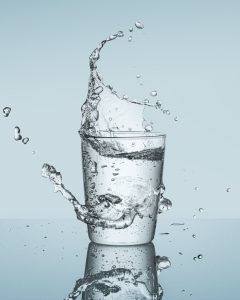Drinking enough water is not only beneficial for your overall health but specifically your heart. Learn why water is vital for heart health.
Drinking plenty of water can improve your health, but did you know it can also lower your heart failure risk? A recent study analyzing blood salt levels (an indicator of overall fluid intake) and heart health explains the connection.
“The importance of hydration has been on the cardiovascular radar for a long time,” says study author Natalia Dmitrieva. As a senior researcher with the U.S. National Heart, Lung, and Blood Institute, Dmitrieva explains it has to do with lack of liquid intake, sodium balance, hormone levels, and kidney function.
Why Water Is Vital For Heart Health
 When there’s a lack of fluid, the body’s blood salt levels increase above a specific threshold (142 millimoles per liter). While the team used the threshold as a reliable indicator of someone’s overall hydration status, current standards consider it normal.
When there’s a lack of fluid, the body’s blood salt levels increase above a specific threshold (142 millimoles per liter). While the team used the threshold as a reliable indicator of someone’s overall hydration status, current standards consider it normal.
However, the team used this measure because “hormone is secreted from the brain” when salt levels exceed it. In turn, “this hormone acts on the kidney to activate water preservation mechanisms,” according to Dmitrieva. As a result, the body’s urine excretion drops and sets in motion a spike in hypertension risk.
Dehydration can lead to elevated blood pressure and eventually undermine the cellular integrity of the heart muscle. Nevertheless, the study also suggests that maintaining good hydration can prevent changes in the heart that lead to heart failure.
The Study
All participants were between 44 and 66 years of age at the start and concluded when they were 70-90 years. They were divided into five groups based on blood sodium levels ranging from 135 mmol/L to 146 mmol/L.
The study took place over the span of 25 years and researchers tracked heart failure incidences and ventricular pumping capacity. Results show that higher blood sodium levels increase the risk of heart disease once they turn 70 or older.
In addition, Mitrieva suggests that the threshold could “potentially be used by physicians during regular physical exams to identify patients who should be evaluated for their drinking habits.”
Ideal Water Intake Levels
The Institute of Medicine in the U.S. recommends a little less than 3.2 quarts for men daily and just over 2 quarts for women. However, Dr. Robert Eckel believes these findings should be taken with caution: “These data in the abstract are interesting,” he says, but they are not definitive proof.
 Moreover, he notes that the findings “are only hypothesis-generating to address whether more fluid intake would reduce the risk for left-ventricle health and heart failure.” He also warns that “too much fluid in the wrong patient could be harmful.”
Moreover, he notes that the findings “are only hypothesis-generating to address whether more fluid intake would reduce the risk for left-ventricle health and heart failure.” He also warns that “too much fluid in the wrong patient could be harmful.”
Eckel is a past president of the American Heart Association and immediate past president of medicine and science at the American Diabetes Association. If you want to effectively promote your circulation and heart health, take a supplement like L-arginine Plus.

